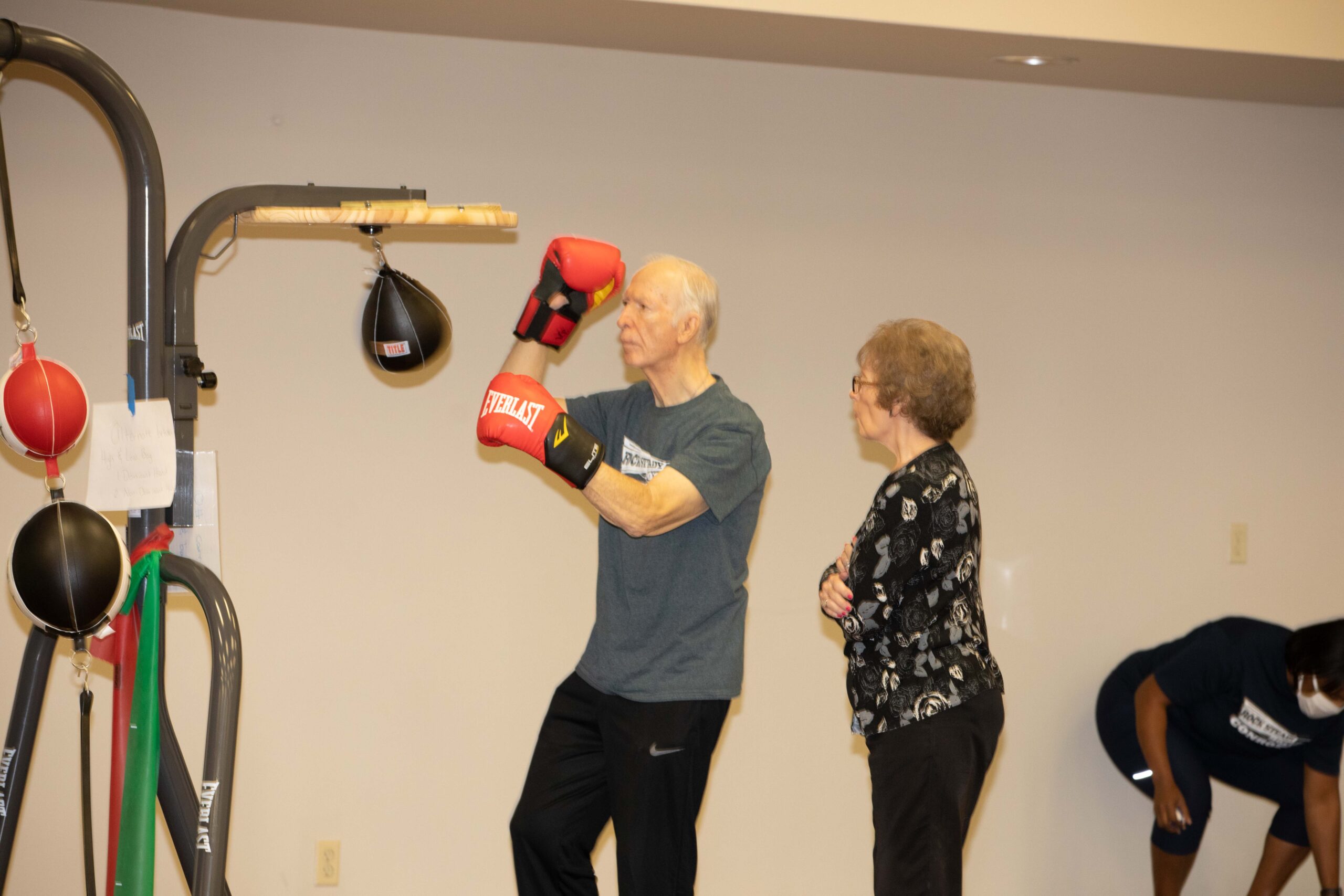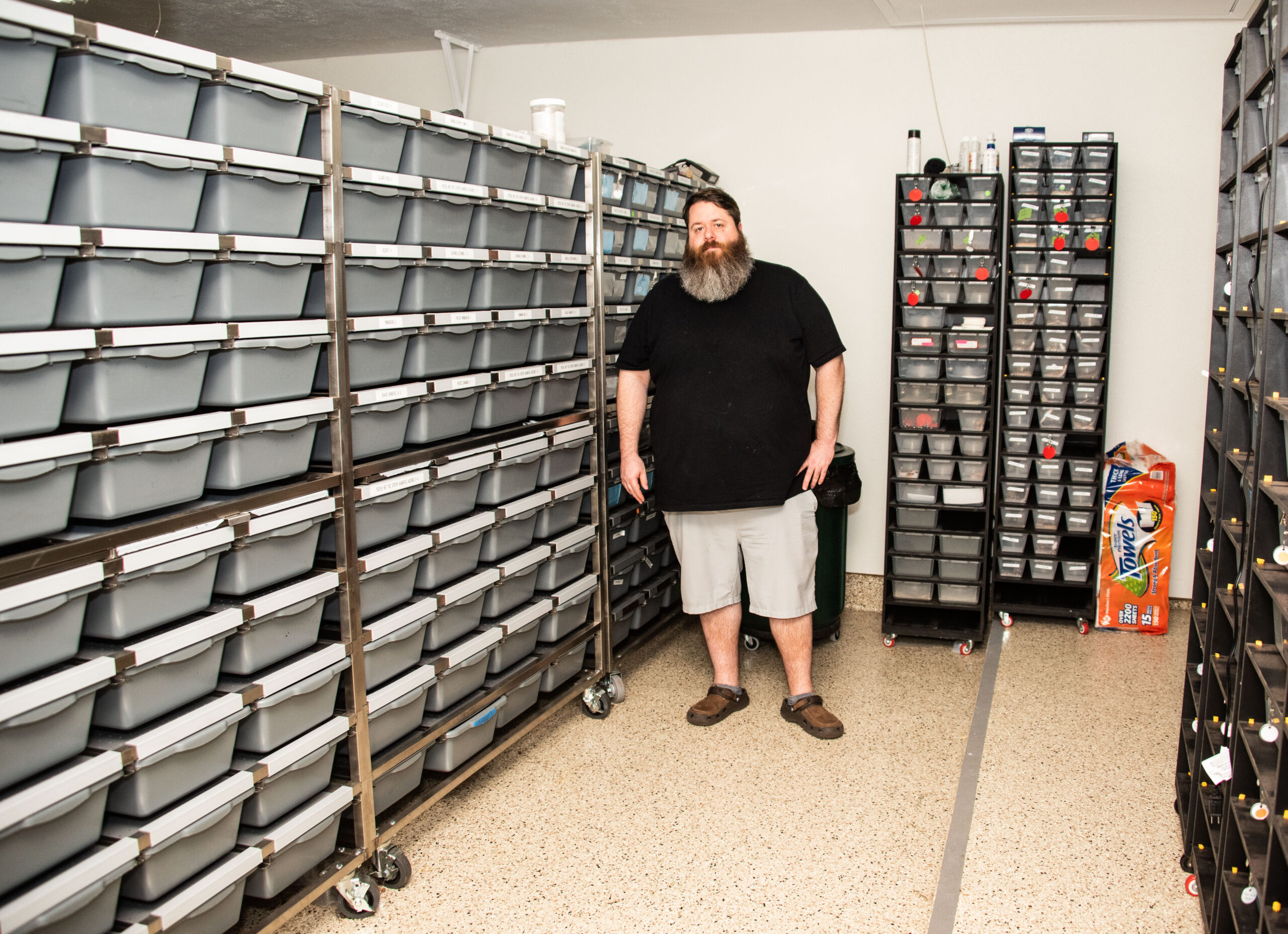They’re fighters. Each week they work on balance, strength and cognitive function to counteract the effects of Parkinson’s Disease. And they do it with boxing gloves.
The phenomenon known as Rock Steady Boxing began in 2006 when Scott Newman, an Indiana attorney, was diagnosed with Parkinson’s Disease at the age of 40. With help from his friend Vince Perez, an amateur boxer, he began working out. The intense exercise helped Scott to improve noticeably, prompting him and Vince to form a non-profit organization to help others achieve the same results. By applying Rock Steady Boxing’s program of non-contact boxing workouts, more than 800 affiliated programs across the globe have helped countless people fight back against a debilitating disease.
For the estimated one million Americans with Parkinson’s Disease, quality of life slowly worsens as the disease progresses. According to the Michael J. Fox Foundation, Parkinson’s Disease is classified as a “movement disorder” because tremors, slow movement, balance issues and stiffness usually occur when nerve cell damage in the brain causes a drop in the level of dopamine—a chemical that coordinates movement. It can also cause memory problems and depression. Parkinson’s Disease, however, is much more. Although it is not considered a life-threatening disease, it can make people more prone to other dangers, such as falls, fractures, and the aspiration of food, which can lead to pneumonia. Because it can encourage a sedentary lifestyle, it may also exacerbate heart disease.
‘An encouraging angel’
Carly Wilson believes in fighting back. After earning a doctorate in physical therapy, she worked with both children and adults for several years before founding the Conroe affiliate of Rock Steady Boxing in August 2019. Participants quickly learned that she is “in their corner.” Wearing T-shirts that say “Fight Back” and “Persevere,” they rotate stations specifically designed to counter the effects of Parkinson’s Disease. At boxing stations, they work on their jabs, uppercuts, hooks, and backhands.
In addition to leading participants through intense workouts, Carly also designs dual-tasking drills that help with cognition, memory, posture, fine motor skills and balance. For example, at one station, participants might write their names in large letters on a whiteboard, then write mirror images of their names. When gloved up, fighters hit a dummy while counting off the hits—by threes. Workouts and drills, Carly says, are designed to be challenging, but every activity can be modified so each individual can be successful.
“Carly is an encouraging angel with a great sense of humor,” says Darlene Dufour, who participated in a Rock Steady Boxing program in Louisiana before moving to Conroe. “My idea of exercise is turning the pages of a book. Extreme exercise is keyboarding,” she jokes. “But they make it fun.” The fact that Conroe has a Rock Steady Boxing program helped convince Darlene to move to the area. She calls the affiliated program here “phenomenal”—even better than the program she attended in Louisiana.
Other participants agree. Dick Jones, who lives in the Lake Conroe area, previously attended other programs for people with Parkinson’s Disease. He found them to be excellent, and decided to try Rock Steady Boxing. “I had big expectations and I was right,” he says. “I started off kind of slow but picked up a little and right now I look forward to it a couple of times a week. I think it has really helped me.”
Bill Trainor and his wife (and “cornerman”), Linda, acknowledge that it’s hard to get motivated to exercise alone. They drive from The Woodlands to participate in Conroe’s Rock Steady Boxing program. They agree that Carly is “very nice, very knowledgeable, very patient,” and say she spends lots of one-on-one time with participants. Rock Steady Boxing, they say, has helped Bill’s strength, agility and balance.
Rock Steady Boxing, however, is more than just work. Being able to associate with other people living with Parkinson’s Disease is one of the most beneficial aspects of the program, says Vickie Potter, who is “cornerman” to her husband, Wayne. “Other than the exercise, the fellowship has meant a lot,” she says. “We get out of the house, out of the routine. We get to know new people, what they are going through.” She particularly enjoys monthly meetings, where attendees can learn about subjects related to Parkinson’s Disease—such as restless leg syndrome, a recent topic—and exchange ideas about doctors, medicines and diet. (The PD Fight Club meets the first Wednesday of the month at 10 a.m.)
Rock Steady Boxing, therefore, is more than just an exercise program. It’s also a support group. “A lot of fighters suffer from depression and anxiety,” Carly says. “Building that rapport and community is just as important as the exercise.”
Boxing 4 More
When Carly saw the big improvements that her fighters were making, she wondered if a similar program might help others. “I saw how they were benefiting from the class and why they were benefiting from it,” she says, “so I wanted to be able to offer a very similar class for other individuals who may want to work on their balance, strength, coordination and posture.” So, she founded Boxing 4 More.
“As we get older, balance and cognition get worse,” she says. Sometimes, gait is affected. “If we don’t practice them daily, we suffer.”
Just as Parkinson’s Disease can be frustrating, so can the simple process of aging. Although most exercise is beneficial, boxing has as unique benefit: “It’s cathartic to get to hit something,” Carly says with a smile. “You can take out your frustrations.” Boxing 4 More is suitable for those who have suffered strokes, Carly says, as a “great next step” when insurance-funded physical therapy sessions run out.
The price of a fast-food meal
Insurance does not typically pay for Rock Steady Boxing, but many participants find it surprisingly affordable. Although classes meet at the City of Conroe Activity Center, adjacent to the C. K. Ray Recreation Center, it is an independent program. After an initial, one-time $45 assessment, participants pay $60 per month to attend class one day a week, $100 per month to attend twice a week or $130 per month to attend three times a week. Classes are held Monday through Friday. Carly notes that sessions cost about $12 each—roughly the price of a fast-food meal; however, while a fast-food meal isn’t necessarily beneficial, attending a Rock Steady Boxing class is.
Scott Keltner was leery about joining Rock Steady Boxing, and procrastinated for about a year before joining, says his wife and “cornerman,” Connie. “Once we came and observed, he was very into it,” Connie says. “He could tell it was helping.”
One participant told Carly that when he retired, he did nothing except sit in front of the TV. “He said since he started coming to Rock Steady Boxing, he can’t sit down at home anymore. He has to be working on a project now,” she says. “He’s the complete opposite of what he was before.”
For more information, visit rocksteadyboxing.org and conroe.rsbaffiliate.com.


